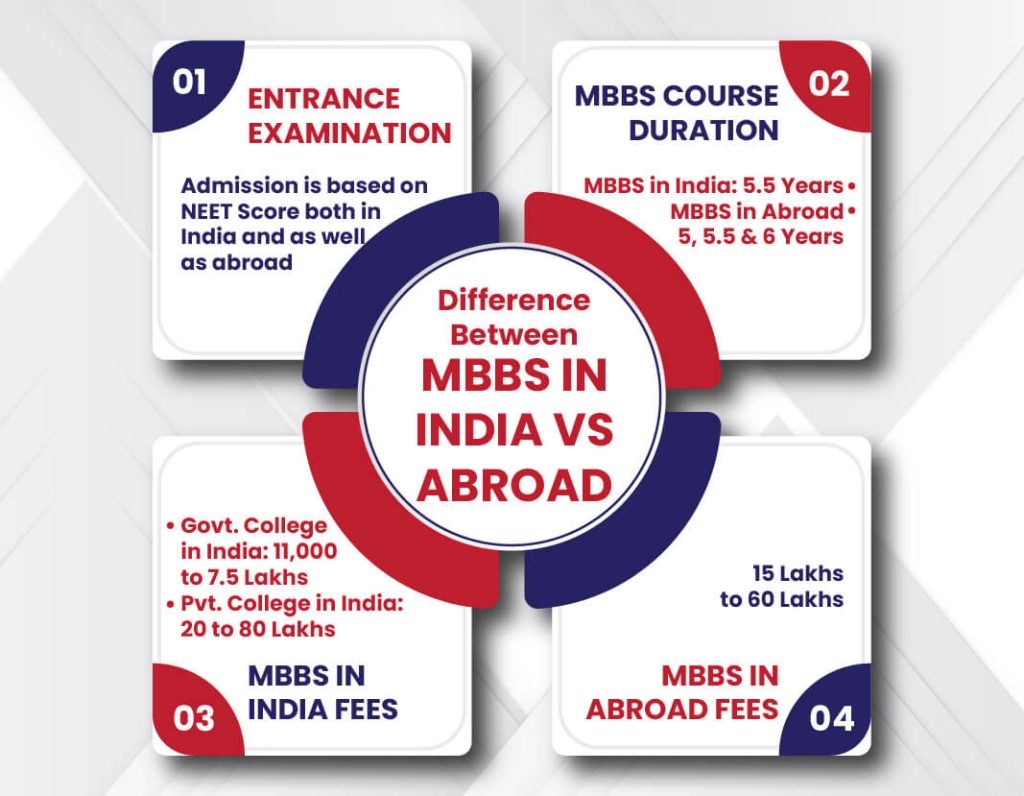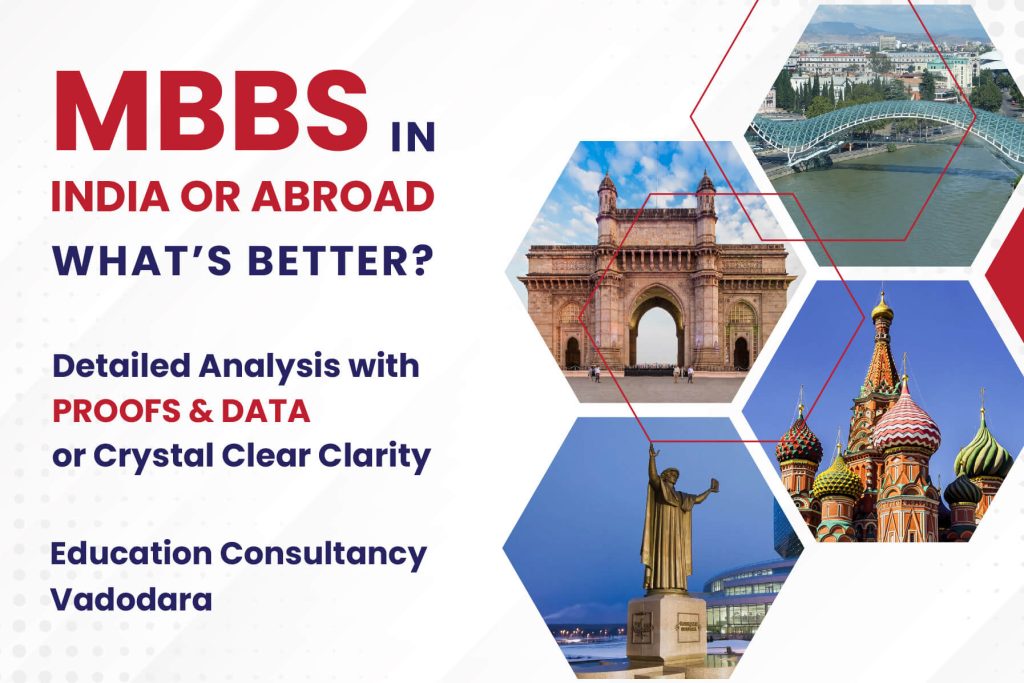Congratulations! If you have secured admission to government colleges for MBBS in India, For those of you who could not make it, read further to explore other opportunities and then decide for yourself. We’ve been working as an education consultancy and guiding students toward pursuing education abroad for more than a decade now.
Choosing the right path to pursue a medical degree is crucial for aspiring doctors. With the growing interest in studying medicine abroad, it becomes essential to understand the advantages and considerations of studying MBBS in India versus studying abroad.
We have been working as an education consultant in Vadodara for quite some time now and specialize in sending students abroad for medical studies.
Through this blog, we intend to provide a comprehensive comparison between the two options, highlighting key factors such as the cost of education, the admission process, and the quality of education.
In a hurry?
Here’s a quick glance at the key differences between the two.

I. Cost of Education:
A. MBBS in India:
Tuition fees and related expenses:
- Pursuing an MBBS degree in India involves various costs, including tuition fees, hostel fees, and other miscellaneous expenses. The average cost of studying MBBS in India can vary across different medical colleges, with government institutions generally having lower fees compared to private institutions.
As an education consultancy firm, we can give you a rough idea of the cost involved. Exact fees may differ from college to college.

Scholarships and financial aid opportunities:
- Indian students pursuing MBBS in India have access to scholarships and financial assistance programs offered by the government, private institutions, and charitable organizations. These opportunities can help alleviate the financial burden associated with medical education.
Return on investment (ROI):
- While the cost of education in India may be lower compared to studying abroad if you get admission in government colleges. It’s important to consider the potential earning prospects. The medical field in India offers various opportunities for employment and career growth, which can contribute to a favorable return on investment in the long run.
Just by doing MBBS, you will probably need a long time to recover your invested amount. If you decide to do a master’s, then it additionally requires an investment in time and money. Thereafter, to begin your own practice, you need to invest in infrastructure, buy/rent a place, hire staff, and then you can practice.
In the initial years, it is hard to get patients. Later on, as your practice progresses, you can get new clients through referrals. You need to consider all this if you want to pursue an MBBS in India.
B. MBBS Abroad:
Tuition fees and related expenses:
- Studying MBBS abroad entails different costs, including tuition fees, accommodation expenses, travel costs, and additional expenses. The average cost of studying MBBS abroad can vary significantly depending on the country and the specific university or institution chosen.
| Country | Average Fees Per Year |
| Russia | 18 to 25 lakh |
| Ukraine | 18 – 22 lakh |
| kyrgyzstan | 9 to 12 lakh |
| Kazakhstan | 3 to 7 lakh |
Scholarships and financial aid opportunities:
- International students pursuing MBBS abroad can explore scholarships and financial aid options provided by foreign universities, governments, and other organizations. These opportunities can help reduce the financial burden for students seeking education abroad. As overseas education consultants in Vadodara, we can help you to gather information about various scholarships, if you intend to pursue MBBS abroad.
Return on investment (ROI):
- Earning prospects and job opportunities for students who complete their MBBS abroad depend on factors such as the country of study, recognition of the degree, and their ability to meet licensing requirements. It is essential to thoroughly research and understand the potential ROI before deciding to pursue MBBS abroad.
Before you apply for admission, you should consult education consultancies and get a list of universities approved by the NMC.
You must be very clear about the career openings. Whether you are going to work abroad after completing the degree or return to India and practice. If you intend to practice in India after getting a MBBS degree from abroad, you need to appear for additional exams.
II. Admission Process:
A. MBBS in India:
Entrance exams:
- MBBS admission in India requires clearing national-level entrance exams such as the National Eligibility cum Entrance Test (NEET) and the All India Institute of Medical Sciences (AIIMS) entrance exam. These exams are highly competitive, and preparation plays a vital role in securing admission.
Counseling process:
- After clearing the entrance exams, the counseling process takes place, during which seats are allotted based on merit and reservation policies. The counseling process considers various factors, including the student’s exam score, preferences, and reservation category.
B. MBBS Abroad:
Entrance exams or admission criteria:
- The admission criteria for studying MBBS abroad differ across countries and universities. Some universities may require students to clear entrance exams specific to the country, while others may consider academic requirements or language proficiency tests for admission. But most of the countries require a 50% score in NEET exams. If you need detailed information about it, you can approach an overseas education consultancy in Vadodara.
Documentation and visa requirements:
- International students pursuing MBBS abroad need to fulfill documentation and visa requirements specific to their chosen country. These requirements may include academic transcripts, proof of language proficiency, financial statements, and the student visa application process. As an education consulting firm with experience spanning more than a decade, we can guide you through the process.
III. Quality of Education:
A. MBBS in India:
Accreditation and recognition:
- Medical education in India is regulated by bodies such as the Medical Council of India (MCI) and the National Medical Commission (NMC). These bodies ensure the accreditation and recognition of medical colleges and degrees. Indian medical degrees are recognized globally, allowing graduates to practice medicine in various countries.
Curriculum and teaching methods:
- The curriculum structure and teaching methods in Indian medical colleges emphasize a comprehensive approach to medical education. The curriculum includes both theoretical knowledge and practical training, with opportunities for clinical exposure in hospitals and healthcare settings.
B. MBBS Abroad:
Accreditation and recognition:
- Medical degrees obtained from foreign universities need to be recognized by the respective country’s medical council or regulatory authority. It is crucial for students to ensure that the foreign medical college they choose is accredited and recognized by the appropriate bodies. If it is not recognized then probably you won’t be able to work globally. As overseas education consultants in Vadodara, we always suggest going with NMC approved institutions.
Curriculum and teaching methods:
- Foreign medical colleges may have variations in curriculum structures and teaching methods. Some institutions may offer unique features such as early clinical exposure, integrated teaching approaches, or specialized research opportunities. Prospective students should thoroughly research the curriculum and teaching methods of their chosen foreign institution.
Conclusion:
When making a decision between pursuing MBBS in India or studying abroad, it is essential to consider personal preferences, financial considerations, and career goals. The cost of education, the admission process, and the quality of education are crucial factors to weigh. Indian medical education offers affordable options with recognized degrees, while studying MBBS abroad provides exposure to different cultures and healthcare systems. Thorough research and consideration of individual circumstances are key to making an informed decision.
If you still have any doubts regarding the choice to be made, then you can approach us. You can either call us or visit our website to view more details. We’ll be happy to help.
FAQ
As an education consultancy, we can provide you with a rough idea of the cost involved in pursuing an MBBS degree in India. The exact fees may vary from college to college. The costs typically include tuition fees, hostel fees, and other miscellaneous expenses. Government institutions generally have lower fees compared to private institutions.
Yes, Indian students pursuing MBBS in India have access to scholarships and financial assistance programs. These opportunities are offered by the government, private institutions, and charitable organizations. As an education consultancy, we can guide you in exploring these options to alleviate the financial burden associated with medical education.
The return on investment for studying MBBS in India may be favorable due to various employment and career growth opportunities in the medical field. However, it’s important to consider the potential earning prospects and the time required to recover the invested amount.
Studying MBBS abroad may offer different ROI prospects depending on factors such as the country of study, degree recognition, and licensing requirements. Thorough research and consultation with an education consultancy can help in understanding the potential ROI in both scenarios.
The average tuition fees and related expenses for studying MBBS abroad can vary significantly depending on the country and the specific university or institution chosen. As an education consultancy, we can provide you with detailed information about the average costs in different countries, such as Russia, Ukraine, Kyrgyzstan, and Kazakhstan.
Yes, international students pursuing MBBS abroad can explore scholarships and financial aid options provided by foreign universities, governments, and other organizations. These opportunities can help reduce the financial burden. As an education consultancy, we can assist you in gathering information about various scholarships and financial aid options if you intend to pursue MBBS abroad.
Earning prospects and job opportunities for students who complete their MBBS abroad depend on factors such as the country of study, recognition of the degree, and their ability to meet licensing requirements.
It’s crucial to thoroughly research and understand the potential career openings and prospects in both the country of study and the desired practice location. Consulting with an education consultancy can provide valuable insights into the career prospects for MBBS graduates from abroad.
MBBS admission in India requires clearing national-level entrance exams such as the National Eligibility and Entrance Test (NEET) and the All India Institute of Medical Sciences (AIIMS) entrance exam.
These exams are highly competitive, and proper preparation is essential to securing admission. As an education consultancy, we can guide you through the entrance exam preparation process and provide information about the admission criteria set by various medical colleges in India.
